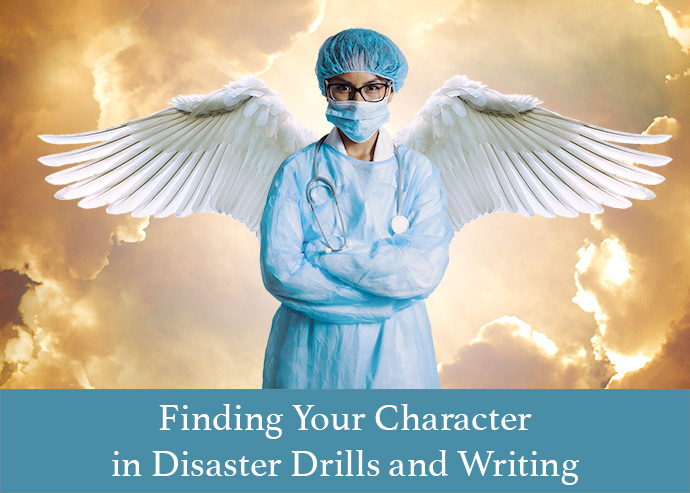Finding Your Character in Disaster Drills and Writing
I recently helped out with a disaster drill at my husband’s hospital, where we volunteers were acting as victims of a bus accident that injured 45 people. The doctors in the emergency room did NOT know this drill was about to happen; this was all sprung on them during a normal workday where actual traumas were going on. Ready, Lincoln Hospital? Here we go!
The day began with the volunteer victims getting injury assignments. I was thankfully not one of the seriously injured—they had to get all made up with makeup that was crazy difficult to get off. I was one of the “worried well,” a term that describes people who are worried that they are injured/sick who are actually okay (as far as medical emergencies go). My role was that of a bystander to the accident who had tried to help, then inhaled smoke which upset my asthma. So, I trudged to the asthma clinic, breathing heavily and gasping for air, and got taken care of.
Hats off to the person who ran this drill. He’s midway through a medical simulation fellowship, the same one my husband did two years ago. The fact that he pulled this off was apparently like “going from the couch to a marathon,” as my husband said. “Next time, let’s do a 5k.” There were some hiccups, some things to learn all around, but all in all, it was an incredibly successful day.
The real-life drama and trauma that I saw—even in the asthma center—made me ever-grateful to the people who deal with this life on a routine basis. I am continually amazed at what my husband does for a living—working in one of the busiest emergency departments in the country—and this drill only reinforced that all of the doctors, nurses, residents, physician assistants, etc., are all heroes, day in and day out. Thank you to all those who treat people on the worst days of their lives.
To relate this to writing: While I was pretend-gasping for air in the asthma center, I was reminded of an acting-for-writers workshop I attended a few years back that was hosted by SCBWI-NJ (Society for Children’s Book Writers and Illustrators, New Jersey chapter). This workshop opened my eyes to the idea that writing is really acting—we’re just performing over time and space, and through words, to our reader. The really good writing happens when you, the writer, are experiencing situations and emotions as your characters do. You are connected to who they are and what they are feeling at any given moment—which, frankly, is one of the most mentally exhausting parts of writing.
You ever hear writers talk about how difficult it is to get into their world on a specific day? This is why. You have to be EVERY actor, the writer, the director, the set designer, the prop master, etc., etc., etc., for Every. Single. Scene.
On some days, it’s wonderful. Being able to live these intense lives is what writing is all about. On other days, it’s downright impossible. So, PSA, people: be kind to your favorite writers!
Anyway. One of the best tips I received from this acting class was to breathe as your character breathes—BEFORE you are feeling the emotion. In the past, when acting in school and community theater, I would wait to “become” the character to “feel” the emotion, but that was backwards. If I wanted to feel fear, I could start panting. With the shortness of breath, an increased heart rate and feelings of panic would quickly follow. Breathing is tied so much to the rest of our natural bodily processes that changing it up will result in some kind of biological reaction within you. Want to feel as sleepy and soporific as your character, who may be under the spell of a sleeping potion? Breathe deeply. Want to feel on the verge of tears? Breathe in quick bursts, catching your breath in your throat.
It’s a wonderful tool to get you in the mindset and mood of your character, and hyperventilating to have a fake asthma attack was a great reminder of this!
Have you ever taken part in a disaster drill? Do you have any tricks for feeling the emotions of a sick or afraid patient or character? Let me know in the comment section below!




